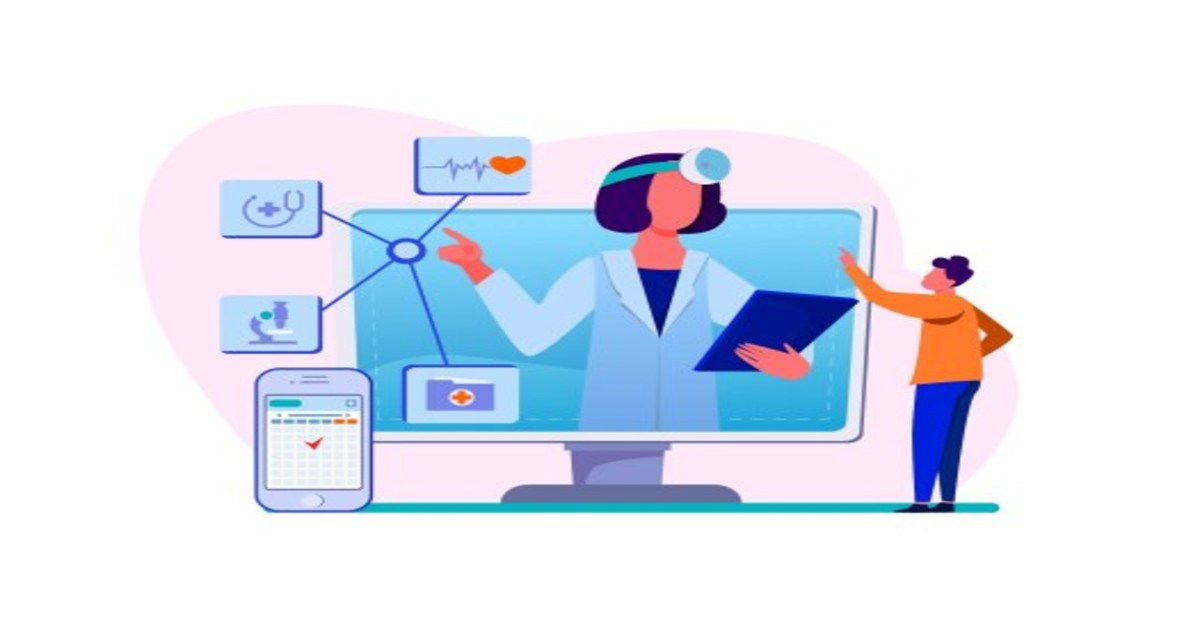
Health Technology, Digital Healthcare
Article | July 14, 2023
Before we discuss the importance of telehealth and how it is changing the nursing industry in general, it is important to understand what telehealth is all about. With the advent of new-age technologies and their impact on the fast-paced, growing population, medical health is an essential department that requires special attention. One’s health is of utmost importance, and to enhance the medical facilities, we as responsible citizens and experts in this particular field must come up with novel and quick solutions to provide optimum precaution and cure. Hence, one of such technological achievements is telecommunication,s and by utilizing such a useful resource, health-related services too can be offered. Telehealth promotes the distribution of various services related to medical health through electronic devices and telecommunication technologies. What can one possibly do if he or she lives in a different country and is pushed to an emergency situation where he requires medical advice from a physician who lives in another corner of the world? Of course, through telecommunication devices, the whole process of exchanging information becomes smoother and easier. Several health-related services such as medical advice, medical care, monitoring, education, remote admissions, and intervention can be extended to a long-distance patient with the help of telehealth facilities. Hence, the contemporary picture of health and medicine has been radically improved with the introduction of these electronic telecommunication systems.
Read More

Healthtech Security
Article | November 29, 2023
Embracing the AI Revolution: Transforming Digital Healthcare Software through AI-Enhanced UX Testing
The wave of demographic change sweeping the United States presents an urgent call to action for healthcare providers. According to the US Census Bureau, adults over 65 will account for a quarter of the US population by 2060, signaling a drastic shift in healthcare delivery needs. More than half a million of this demographic will be centenarians, accentuating the need for digital experiences tailored to seniors' unique needs.
Despite the rapid advancement of digital health technologies, research indicates that many senior citizens struggle to adapt. A recent study reported that 40% of adults over 65 believe their telemedicine visit was inferior to traditional in-person care, with a meager 5% finding it superior. The promise of convenience delivered by digital health is often overshadowed by the frustration associated with technical difficulties. An astounding 75% of senior citizens admit they need assistance when using new electronic devices.
Let's consider the patient portal app, a common touchpoint in the digital health journey. Despite its apparent simplicity, seniors find processes like logging in troublesome due to issues like forgotten passwords, technical bugs, or content readability. This scenario underlines the crucial need for comprehensive User Experience (UX) testing to eliminate these barriers and provide a seamless digital health experience.
The Complex Landscape of Healthcare UX Testing
The complexity of UX testing in healthcare has been exacerbated by the interplay of multiple modules, services, platforms, and vendors. Take Electronic Medical Record (EMR) systems, for instance, which undergo frequent updates, each one potentially impacting the system as a whole. Traditional manual testing methodologies are proving to be time-consuming and costly.
Though automation has revolutionized sectors from automotive to finance, the healthcare industry appears to be lagging. A study by the Health Information and Management Systems Society (HIMSS) reveals that a mere 15% of healthcare providers have adopted modern test automation platforms. Meanwhile, a significant 41% still rely on manual testing. As EMR systems grow increasingly complex and customized, this over-reliance on manual testing poses daunting challenges.
The gravity of this issue is amplified by a startling revelation from the HIMSS study - only 6% of healthcare executive leaders express confidence in their organizations' testing practices. In an increasingly digitized healthcare environment, such a low level of assurance raises substantial concerns about patient safety. Although 75% of the surveyed providers have invested in software testing to safeguard their bottom lines, nearly two-thirds confess feeling inadequately resourced in terms of time, money, and talent to meet future testing requirements. As the list of testing demands grows, QA teams are frequently stretched thin, leaving many potential user journey scenarios untested.
The Power of AI in UX Testing for Better Patient Outcomes
AI technologies hold the potential to revolutionize UX testing in healthcare.
The modern healthcare application is a labyrinth of potential user journeys - a typical mobile application model can yield over 9 billion separate scenarios. To effectively navigate this colossal testing landscape, test automation tools employing Machine Learning (ML) algorithms are critical.
By analyzing historical patterns, prioritized cases, and real-user insights, ML algorithms can auto-generate test cases and meticulously scrutinize each user interaction. This approach ensures an optimal digital experience and robust coverage of potential issues.
The HIMSS study also provides a glimmer of hope, revealing that nearly 80% of healthcare providers plan to adopt real-time testing analytics for quality assurance. AI's role becomes pivotal in augmenting the capacity of software testing teams in this scenario.
By leveraging historical patterns and prioritizing test cases, ML-powered testing tools can automate crucial tests across various platforms, devices, and operating systems. This symbiosis of human expertise and AI not only bolsters productivity but enables comprehensive testing coverage within tight time constraints.
The Future of Healthcare Software UX Testing
The path to perfecting a patient’s digital journey is fraught with challenges.
Healthcare organizations venturing into automated software testing or contemplating in-house tool replacement must stay abreast of evolving healthcare testing requirements. This understanding is key when evaluating automation vendors against the backdrop of regulatory standards. Opting for a technology-agnostic solution ensures extensive test coverage, boosts efficiency, and guarantees longevity as technologies advance. Introducing your software QA teams to user-friendly, low/no-code test automation tools can simplify the onboarding process and fosters better collaboration with Dev teams and business testers.
As we stand at the precipice of this transformative period in healthcare, it's clear that the AI revolution holds the key to unlocking the future of digital healthcare UX testing. By harnessing AI's potential, healthcare providers can ensure a user-friendly, seamless digital experience for the fastest-growing demographic, setting new industry standards in the process.
Read More

Healthtech Security
Article | August 31, 2023
Artificial Intelligence or AI has attained continuous evolution over the years and witnessed widespread adoption across major industries of the globe. The Forbes report of December 2021mentions that the number of AI startups since 2000 has increased 14 times, and investments in AI startups have grown six times. It underlines the fact that the AI industry, powered by its path-breaking developments and innovations, has always been an attractive and trending option in the market.
Within a very few years, AI has taken over different segments of healthcare like wellness, early detection, diagnosis, decision making, treatment, research, training, public health functions (surveillance and outbreak response), virtual care etc. A study by Accenture claims that AI-enabled devices and gadgets meet 20% of the clinical demands, and this has reduced the unnecessary visits to hospitals by a great number.
Applications of AI in healthcare is broadly categorised into 3 segments, namely, Patient-oriented AI; Clinician-oriented AI; and Administrative-oriented AI. The transformative role of AI in healthcare is undeniable, as it scripts new journey for patients and practitioners, alike.
According to Healthcare IT News, 63% of the research subjects agree to the observation that the devices and machinery enabled by AI have provided excellent value to the specialty healthcare divisions like radiology, generic pharmacy, pathology, etc.
The rapid growth of AI in highly delicate domains like healthcare calls for great promise to accelerate diagnosis and treatment. At the same time, it also puts ethics, patient safety and privacy concerns at the heart of it; thereby calling for a framework of governance. Gartner report of July 2019 predicted the application of AI in more than 75% of the healthcare delivery organizations (HDOs) around the globe.
Since most of these HDOs are new to adopting and applying AI-enabled machinery and services, AI governance is crucial to prevent the actions that may lead to errors, misjudgements and further chaos. Moreover, the degree of variance in the application of AI is high, and therefore it is not advised to implement the AI mechanisms without proper guidance or governance.
From AI-enabled smart bands to pacemakers, the range of devices and gadgets offered by the AI industry is simply remarkable. The implementation of AI in the healthcare sector has proven to be highly effective in drastically reducing the scope of slipups. Moreover, AI has also facilitated early detection of illness with the help of daily use gadgets and devices in a smart way.
At this juncture, it is equally important to create data governance framework that ensure ethical principles are applied to patient, providers and payers’ data. Further, AI initiatives by healthcare providers should be created using transparent protocols, auditable methodologies and metadata. These technologies should do no harm, reduce biases and help patients make informed decisions about their care.
A significant part of AI governance also lies in change management. To build trust towards AI’s adoption across the healthcare ecosystem, there should be a dialogue between clinicians, scientists, technologist and end-users. Such discussions will address the opportunities, value and investment, including concerns across the stakeholders.
In fact, prominent think tanks suggest healthcare providers to establish an AI Governance Council to monitor the value, investment and use of strategic AI capabilities. Some of the crucial roles and responsibilities for the Council include addressing legal and regulatory compliance; clinical evaluations; ethical usage guidelines and organisational deployment of AI across the system.
AI is indeed a revolutionary technology that has huge surprises up its sleeves for the future. But exploring new frontiers comes with its fair share of challenges. Establishing appropriate governance over AI implementation and initiating a conversation around the ethical implications and regulations as well, will play a fundamental role in the introduction and scale-up of AI in healthcare.
Read More

Article | December 9, 2020
The pandemic-fueled technology adoption has enabled the healthcare industry to address the challenges, including cybersecurity, telehealth, invoicing and payment processing, patient experience, effective payment model, and big data. The responses to the unusual COVID-19 pandemic has sped up the adoption of new digital technologies in the industry. It has also fueled advancements in health technology. From the start of 2020, these advancements transformed the healthcare industry into a next-gen one by accelerating digitization of their internal and external operations by two to three years.
This surprising impact of technology in the healthcare industry has brought out unexpected competition between the key players in the B2B healthcare market. Whatever the field, adapting yourself to modern changes is the best strategy to thrive. Get yourself updated according to the changes or get yourself outdated is the new norm in the healthcare industry.
The following trends and advancements in technology in the healthcare industry due to the pandemic in 2020 show that healthcare providers are always searching for new ways to improve their productivity, performance, and efficiency. These were the need of the hour during the pandemic, for them to surge ahead of their competitors.
• Telemedicine
• Artificial Intelligence (AI) in healthcare
• The Internet of Medical Things (IoMT)
• Supply chain management technology
• Privacy issues
• AR/VR/MR in Healthcare
• Blockchain
• Digital marketing trends in healthcare
This article looks into the major innovations, advancements, and trends brought out by the global pandemic in 2020 in the healthcare industry.
Pandemic-fueled Advancements
One of the biggest challenges faced by the healthcare industry in the US today is its digital capacity to effectively engage consumers and make them stay healthy. This can include helping people to prevent getting infected by various diseases such as COVID-19 and effectively managing various other chronic conditions. This is where technology in the healthcare industry has a major role to play.
Due to the latest advancements in technology, the healthcare industry was already evolving but the COVID-19 pandemic accelerated this transformation dramatically. McKinsey reports that US$250 billion was spent on technology in the US healthcare industry to shift the industry into a virtual care model in the wake of the pandemic. Also, a study by FAIR Health, a non-profit group, says the increase in telehealth claims in the US is 4,000% in 2020.
Here’s a detailed look into the above-mentioned advancements, innovations or trends brought out by the pandemic in the industry.
Telemedicine
Had the world ever thought that it would be possible one day for doctors to remotely examine the health of patients via a smartphone or a computer? Telemedicine, a new trend in technology in the healthcare industry, addresses many challenges in the industry. Improved technology in the industry has made telemedicine easier, even for people, who are not computer savvy. Telehealth services are now provided through different telemedicine apps.
In the light of the pandemic, rather than in-person visits, 43.5% of primary medical visits were done using telehealth methods in April 2020 in the US. The major benefit of telemedicine is that it reduces contact between healthcare workers, patients, and other patients. This reduces the chances of the spread of infectious diseases.
Reports say that 71% of Americans considered telemedicine useful at the beginning of the pandemic. This trend is expected to continue in the coming years too. With the pandemic, telemedicine saw an immediate boom compared to previous years. This boom in telehealth is projected to break US$185.6 billion by 2026.
Artificial Intelligence (AI) in healthcare
Artificial intelligence, a new trend and advancement in technology in the healthcare industry, had a critical role in fighting the pandemic. AI played a major role in areas such as pandemic detection, vaccine development, facial recognition with masks, thermal screening, and analyzing CT scans. AI is becoming the new operating technology in the healthcare industry.
Major AI healthcare applications
Healthcare providers will benefit a lot from AI-driven tools as AI technology in the healthcare industry has become a transformational force. Machine learning algorithms and software in AI will revolutionize the use of technology in the healthcare industry and the science of healthcare in the coming years too. AI will unify machines and humans through the brain. Some of the AI technologies in the healthcare industry, which are very relevant, are machine learning, natural language processing (NLP), rule-based expert systems, physical robots, diagnostic and treatment, patient engagement and adherence, and administrative applications.
Benefits of AI in healthcare and statistics
AI addresses many challenges that present technology in the healthcare industry cannot tackle. Better data-driven decisions, increased disease diagnosis efficiency, reduced treatment time, easy integration of information, reduced costs, increased patient satisfaction, fewer errors, and easier payment options are some of the benefits AI-assisted technology in the healthcare industry can provide.
According to an analysis by Accenture, by 2026, clinical AI health applications are expected to create approximately US$150 billion for the US healthcare economy as annual savings. Also, the US AI health market is expected to reach around US$6.6 billion by 2021.
The Internet of Medical Things (IoMT)
Nowadays, medical interactions involve some sort of equipment or device; it can be a glucose monitor, blood pressure monitor, or even an MRI scanner. It may not be a surprise now that, according to a 2020 Deloitte report, the available number of medical technologies are around 50,000. The internet-connected devices, which are known as IoMT tools, are transforming the healthcare and technology in the healthcare industry.
What Is IoMT?
The connected infrastructure of software applications, medical devices, and health systems and services are the IoMT. This has emerged by combining IoT development with telehealth technologies and telemedicine.
Potential of IoMT in healthcare and statistics
Lower costs for care, fewer mistakes, and more accurate diagnosis are the potential capabilities of IoMT. IoMT paired with various smartphone applications allows patients to send information regarding their health to doctors and get treated for diseases. This type of technology-driven healthcare not only improves patient experiences but also reduces the cost. IoMT, the new trend in technology in the healthcare industry, also has a positive effect on drug management.
According to Goldman Sachs, IoMT will save US$300 billion annually in the healthcare industry. AllTheResearch expects that the global IoMT market value will reach US$254.2 billion from US$44.5 billion in 2018.
Supply chain management technology in the healthcare industry
Utilizing advanced supply chain management technology in the healthcare industry enables healthcare providers to reach the right patients with the right product at the right time. Digitalized supply chain management also makes healthcare organizations improve provider-patient connectedness, data flow and analytics, regulatory compliance, and asset tracking.
A range of challenges faced by healthcare providers prompts you to digitalize supply chain networks, using the latest technologies in the healthcare industry. Advanced supply chain management technology will help you optimize costs, reduce unnecessary variation due to error and variability, enhance patient care, engagement, and delivery, and address new value-creation priorities.
According to reports from market researchers, global healthcare supply chain management technology is expected to reach US$3.3 billion in 2025 from US$2.2 billion in 2020.
Privacy issues
Privacy is a serious concern in technology in the healthcare industry, especially because of HIPAA compliance in 2020. Although data and information of patients can be efficiently stored and retrieved through cloud computing, complying with the strict electronic Protected Health Information (ePHI) is difficult.
While electronic health records and sensor networks, and advancements in other technologies in the healthcare industry will surely improve the quality of healthcare by reducing medical errors and costs, associated security and privacy are challenges to be addressed. Journal of the American Medical Informatics Association estimated that stolen or lost PHI may cost the US healthcare industry approximately US$7 billion annually.
To solve these issues, hospitals, and other healthcare providers have to stop using outdated technology and adopt state-of-the-art technologies without violating HIPAA. Encryption technology in the healthcare industry is the best option and healthcare providers should start using it to ensure the privacy of patients.
AR, VR, and MR in Healthcare
Virtual (VR) and augmented reality (AR) are important technologies in the healthcare industry to enhance and ensure the quality of telemedicine, especially during the period of the pandemic. The pandemic has made these technologies more popular and the trend is expected to continue in the future too. Both of these technologies in the healthcare industry are used to enhance patient and provider visits and even to educate medical students.
AR and VR also have the potential to help stroke victims overcome deficiencies, assist in robotic surgeries, educate patients before surgeries, facilitate easy surgical planning, help patients with PTSD, and reduce anxiety in children during a painful procedure or blood tests. Mixed reality (MR) is the mixed use of both VR and MR in a patient’s healthcare process and is also gaining popularity.
Blockchain
Blockchain is a trend which is expected to revolutionize technology in the healthcare industry. Using blockchain or digital ledgers will enable you to securely distribute transaction records to patients with improved data security. Along with other trends such as cloud computing and IoMT, blockchain also offers portability, accessibility, and high security. One of the greatest benefits of blockchain technology in the healthcare industry is interoperability.
As blockchain provides full visibility through a digital ledger, it improves integrity and transparency. Blockchain technology in the healthcare industry is beneficial to handle clinical study information, patient wearable data, and patient records.
Scope of blockchain technology in the healthcare industry
Various statistics on blockchain technology in the healthcare industry expect a wide scope for this technology. The global blockchain technology market in the healthcare industry is projected to cross US500 million by 2022.
Digital marketing trends in healthcare
Digital marketing technology in the healthcare industry has been revolutionized as new trends were set by the pandemic in 2020. As the world shrunk to online mode during the pandemic period, the following healthcare digital marketing trends emerged.
Content marketing
The smartest way to attract new patients to your service is content marketing and educational content. 2020 is the time where the content truly emerged as king. Educational content is vital in the healthcare space because everyone always tries to learn new things. It can be a trick or tips about the latest technological advancements, general industry news, or new diagnostic options.
Mobile responsive websites
Another important digital marketing technology in the healthcare industry is making an attractive website, which also must be mobile responsive. In this modern world of technology, everyone wants to access every facility at their fingertips. So, if your website is not mobile responsive, you won’t get traffic to your website easily.
Along with these two trending digital marketing technologies in the healthcare industry, some of the other trends are:
• Video marketing
• Multichannel initiatives and customer touchpoints
• Online reputation
• Powerful presence on social media channels
• Location-based SEO
The essential trends and advancements in technology in the healthcare industry depicting the future of healthcare are machine learning, artificial intelligence, and data science along with a focus on effective healthcare digital marketing technology and strategy. The pandemic fueled B2B healthcare technology will make the industry evolve every year and go on resolving new challenges that arise.
Frequently Asked Questions
Why is technology important to the healthcare industry?
Integrating technology with healthcare industry will improve quality of life. Also, the use of digital technology in the healthcare industry will increase efficiency, quality, and patient experience.
What is new technology in healthcare?
Due to the COVID-19 pandemic, many trending technologies are used in healthcare. The new technologies in the healthcare industries are AI, blockchain, chatbots, voice search, and virtual reality.
What are the negative impacts of medical technology?
Medical technology can have some negative impacts on patients such as impersonal or minimized care, negative health effects, increased patient costs, inappropriate use, and invasion of privacy.
Read More